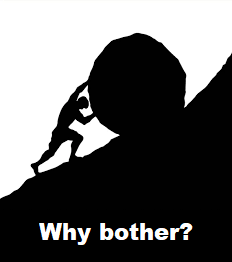I am tired of "truth"☒
"In vino veritas." (Pliny the Elder)
There are times when truth matters. Example: If I ask my board cretified dermatologist: "Do I have any moles ('birthmarks') on my body that have any potential to turn into melanomas? Yes or no." The truth there matters a lot; it's a matter of my life and death. All occasions where truth matters are times when something insalubrious is involved. But as long as we wake under a peaceful sun, we must live an everyday life. Aleksandr Solzhenitsyn said that and he apparently lamented ever having to put up with a peaceful sun; I (BMcC[18-11-46-503]) pray to live in uninteresting times.
In peaceful times, truth matters less. Then what matters is "luxe calme et volupté" → Joy in life. A small mind's correctnesses are worth far less than a larger mind's errors, because the former never tell us anything that expands our imaginative horizon, whereas the latter may do that. Facts should just be raw material for imaginative elaboration and tranfiguration. A good story is worth more than a lumpen news report. I don't care much if General George S. Patton actually said: "Three divisions in 84 hours." It's more inspiring than whether George Floyd died due to Derek Chauvin's knee on his throat or some comorbidity; Chauvin was apparently having a bad hair day or he was just a very bad person; put him away and be done with the pettiness of racism. Isn't a delightful partial fabrication lightly presented as if it was fact better than nothing but more of "the same old same old" or somebody telling about something they did that was just instantiating some preexisting social custom (such as buying the latest fashion or reading the latest best-seller, etc.)?
Edmund Husserl said something relevant here: "'My' Plato would remain for me even if all his writings turned out to be false fabrications.... Every philosopher exercises a power over my philosophical life as my 'poetic fiction', and therefore independently of the question of the degree to which my interpretation corresponds or not to factual-historical truth."
I like Paul Robeson and I do not like The Reverend Doctor Martin Luther King Junior[1]; I like Joe Biden and I do not like Donald J. Trump, etc. What would be wrong with being on acid with a Kandinsky painting, as opposed to being stuck with political correctness in sobriety? Black "class" beats "white trash", but all Wokies are the same color: bad. Let us live in a reality as good as the most ethereal of Wassily Kandinsky's paintings! How 'bout it, Vas'ka? (Vas'ka answers: "Meow!")
But lest any hypocrites out there (and if you take offense at a word you are one, aren't you?) take comfort, I am also tired you all your lies and your smiling faces. Please just go away. ☠

Contrary the the stultifying notion that truth as a straightjacket I must put up with being coerced into by persons with power over me, i.e.: to which my thoughts and feelings must conform, Professor Martin Heidegger[2] said that the presocratic Greek thinkers saw αληθεια, i.e.: "truth" (or knowledge) as the coming of things into the light of human existence which, of course, is always personal, not some kind of subordination to an external entity such as grade imposing teachers or an Omnipotent God.
Hearkening to versus attending to: In perp school, I was supposed to attend to"my" assignments (i.e.: the tasks the teaches tasked me with), not to hearken to the social formation in which said assignments had their ground: I was supposed to just do the assignments, not question whether said assignments should exist. Thus was I ignoranced to myopically (debasedly) see myself as an entity that should endeavor to get good grades in by-teachers-predefined subjects, as opposed to studying the school and its encompassing social surround, to judge if it was any good and how it might be improved to be more constructive for me and for others. I was prodded and poked at to unthinkingly attend to the message, not to hearken to the medium.
And I distrust ethics
"Do what you will." (François Rabelais, rule of the Abbey of Theleme)
Baldly stated, ethics has nothing to do with philosophy, although philosophical cogitations may be adduced as motivational tools for ethical ends. The only question in ethics is a practical, empirical one: What benefit for whom, at what cost from whom?*
And you cannot weasel out of this by saying you have disinterested universal values to which you wish to subject me, because then that is the benefit for whom: for you to enjoy me actualizing your values. As to the cost, I have generally found in my less-than-life that somebody is trying to extract something from me that hurts me but benefits their desires, such as, in the preceding sentence, their desire to see me actualize their pet [disinterested universal...] value. If I don't get more than I give then there is no reason for me to participate.
Of course you can threaten me with material harm, such as to rip my body to pieces whilst I am still alive, and that obviously will affect my cost-benefit calculation. But don't pontificate to me about "values": It's your desires you are trying to actualize at my expense. So fess up to being a Big Bully.[5] That's my value. But what benefit would there be in you for that, especially when you have limitless power to torture and kill me? Answer: None. So I am SOL (Shit Out of Luck) → unless I have power to stop you, and that would, or course, chaige your cost-benefit calculations. And on and on it dialectically goes....
An alternative may suggest itself: scrap the ethics verbiage. Offer me a deal that promises to improve your situation in living in terms of your feelings, and also promises to improve my situation in living in terms of my feelings. Isn't that simple? Win-win is a winner all around, isn't it? Q.E.F.
Ethics is close to morality Morality is people's never ending determination to deprive me of erotic joy. Ethics is their desire to murder (aka: "sacrifice") me for their "The Good". They should lead from the front, and then keep their virtues to themselves, i.e., be celibate (or castrate themselves) and die for what they believe in. Why do people want to deprive me of life, liberty and happiness? Life? The Selective Service System (my identification number: 18-11-46-503). Liberty? Keep America beautiful, get a haircut. Happiness? They got a head start depriving me of pleasure, by, soon after birth, genitally mutilating me ('aka'; "circumcision).
I do have an ethic. It is the principle of symmetrical communicative interaction, otherwise known as: mutual respect among peers:
If I do not care about what matters to you then I have no reason to expect you to care about what matters to me. If you do not care about what matters to me then you have no reason to expect me to care about what matters to you. (See also: here)
Neither selfishness: "You care about me at your expense and even though I do not care about you", nor altruism: "Me care about you at my expense and even though you do not care about me". Tragedy is where "it costs me to care about you" or: "it costs you to care about me", sentimentally known as: heroism and sacrifice. But sentimentality neither raises the dead nor compensates the living. Eulogies do nothing for the eulogized.
If you do not respect me then I have no reason to respect you, starting with my parents and perp school teachers. Those people were disrespectful of me. If they were looking for a name by which to address me, they could have found it at Exodus 3:14: "I am who am." (That is basic transcentental philosophy, but they were ignorant.) It should have been their problem if they did not respect themselves equally much, if they had eyes but did not see and ears but did not hear (Jeremiah 5:21, etc.). In the land of the blind, the one eyes man is surgically operated on to remove his eye and make him healthy, whole and most important of all: normal, like everybody else. Thus was my childhood and youth wasted, and I was badly injured by them. They were what they were.

In a lecture on Heraclitus, Professor Martin Heidegger says something I find hopeful: He says that επιστημη ηθικη, i.e.: "ethics", for the presocratic Greek thinkers meant: sojourning in the midst of all the things that are in the world. The individual's orientation in living, not computing how long you will spend in Purgatory by calculations from behavioral axioms ("norms"). To think of my life as an adventure in being a light of the world sounds much more appealing to me than to have to put up with constellation (constipation?) as an object of intrusive external dictates (i.e.: somebody's "The Good" du jour[3]). 18-11-46-503.
To reiterate
"The way is everything; the end is nothing." (Willa Cather)


Instead of stultifying suffocation by truth as conformity to claptrap people mindlessly mouth by rote from out of their childhood social conditioning, and ethics as surveillance police enforcement of parochial customs of the social surround that conditioned them, the liberating vision of myself as an individual site of the coming into light of all things and the world as such in an open personal journey sounds to me like it would be worth living, i.e.: enjoying. Not Selective Service System (SSS): 18-11-46-503, and all the other disrespect to which I have been subjected by people who have eyes but did not see and ears but do not hear (Jeremiah 5:21, etc.). "H.L. Mencken's definition of Puritanism[:] the haunting fear that someone, somewhere, may be happy.'" (Paul Krugman, NYT OpEd, +2021.03.19)
I may not be able to do anything about it or about them, but I reject being treated as a goose for small minds with petty power's foie gras (right) → people whose only claim to respect, until recently (I am now older than many of them were when finally they belatedly died), was that they had defecated more times than me. Their: Scheißestückwelt; Somebody! Anybody! Please flush![4]
Footnotes
- ↑ I feel it is important to load as many honorifics as possible upon the names of persons who do not deserve respect, to set an example for them to shape up and learn to respect me. Even more important, when students call famous people by their names without honorifics, I hypothesize that is a ruse to help them feel they less unimportant than they in fact are. Students are not peers of their teachers: the teachers can harm the students but not vice versa. All possible measures should be deployed to "rub it in", in hopes of getting the oppressed to rebel against their oppressors.
- ↑ I have studied Professor Heidegger's writings. I consider him despicable for having thrown his teacher, Edmund Huserl to the wolves, albeit I hate to say that because I find it repugnant to agree with anything and thereby give aid and comfort all the petty people run their mouths off. It is important to keep that just because Donald Trump breathes the air of earth's atmosphere that does not logically entail that inhaling and exhaling are bad. So too with Heidegger. A lot of what he writes has substantive value, at least in my opinion which does not matter to anyone except to myself and I wlll soon be dead so I would invite them to celebrate tha by feasting on my rotting flesth, either raw or cookes however they may prefer, but please, not while I yet am trying despite them to live. Rrose Sélavy.
- ↑ Wasn't Moses despicable? Shouldn't he have come down from Mount Sinai and said to his people something like: "Hey, guys and gals. The Omnipotent Ruler of All Creation gave these tablets to me. Please each of you review them and see if you can learn anything from them. They will be available in the reserve book room Ark of the Covenant if you want to refer to them. Take them or leave them as each of you may deem useful for yourself. Thanks for coming here and listening. Class dismissed"
- ↑ Probably in 12th grade of school, I read a book which, like everything else in my less-than-life, I did not understand much of due to my innate abilities, my whole soul having been crushed by my childhood downtaking (antipode: upbringing), so that I am incapable of understanding much of anything.... But I very clearly understood the book's ending: Italo Svevo's "Confessions of Zeno". A man burrows to the center of the earth and plants a big bomb there, which he detonates, thus cleaning the universe of all the pollution on the surface. Given the opportunity I would have done likewise; the game would have been worth the candle.
- ↑ The detailed logic here is as follows: Define the proposition "P" as follows: For some "I" and some "X", "I want X". My substitution instance is: "I (BMcC[18-11-46-503]) want to enjoy my life". Your substitution instance is: "I [whoever] want [BMcC[18-11-46-503] to do [whatever I want him to do]]". We each want exactly the same thing: an instance of proposition P. But nowhere here have we agreed on the proposition "Q" as follows: "for Some "I" and some "Other" and some "X", "For I to want X entails Other does X", where the substitutione values for Q are either [[whoever], BMcC[18-11-46-503], [whatever whoever wants]] or: [I (BMcC[18-11-46-503]), [whoever], [whatever BMcC[18-11-46-503] wants]]. Apart from coercion, only persuasion can work, where somehow the Other person is maneuvered into choosing to do what the I person wants from him. Not logic, but enticement, so you want to entice me so you can get what you want: to hurt myself. But as it happens, that's not what I want. just like you, I want what I want, or stated the other way around: Just like me, you want what you want. We agree [obviously: to disagree]. I welcome you to have your ideas about what I should do so long as you do not threaten material harm to me for not making you happy at the expense of me making myself unhappy (to make you happy). Only if we agree on the formal structure of the interaction can the context be adjudicated (example: "Keep America beautiful: get a haircut!" Is the formal structure that character string to be a performative command or to be a speculative example of a possible ethnic social custom?) If you do not coerce me, I entertain your statement about what I should do as data about your psycho-social situation in life. Why can't you simply, straightforwardly want to play nicely with me?

 Welcome
Welcome

